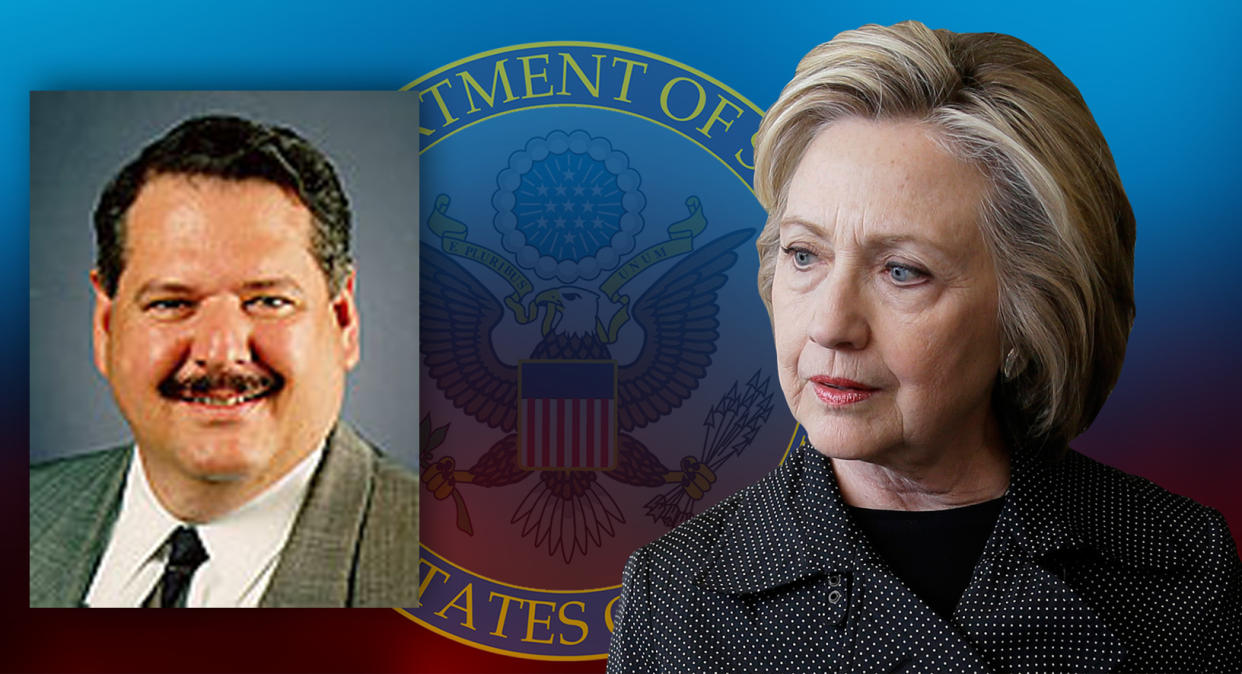Senate sleuths focus on ex-State Department aide in Clinton email ‘cover-up’

As Hillary Clinton seeks to rebound from a highly critical report from the State Department’s inspector general, Senate investigators and a conservative group are zeroing in on newly revealed evidence about the activities of a now retired State Department computer specialist in orchestrating what they charge was a “cover-up” of the former secretary of state’s email practices.
The role of John Bentel, whose identity as a key figure in the email probes was first reported by Yahoo News on Wednesday, is expected to be one focus of questioning today when Clinton’s former chief of staff, Cheryl Mills, is deposed in a lawsuit brought by Judicial Watch over the State Department’s handling of Freedom of Information Act requests relating to Clinton’s emails, according to a source close to the case.
Sen. Charles Grassley, chairman of the Senate Judiciary Committee, is also signaling that he intends to pursue Bentel’s role, saying that statements in the inspector general’s report show he “muzzled” staffers who warned that Clinton’s exclusive use of a private email system might be in violation of federal record-keeping laws.
Bentel served as the chief of “Information Resource Management” — essentially, the top official in charge of internal communications, security issues and record-keeping — inside the State Department’s Executive Secretariat, the professional support staff for the secretary of state. In late 2010, according to the inspector general’s report, two staffers inside his office, in separate meetings, raised concerns that Clinton’s private emails could contain government records that needed to be preserved — a standard requirement under a 1950 law known as the Federal Records Act.
One of the staffers told the inspector general that Bentel responded that Clinton’s private email account had been “reviewed and approved by Department legal staff” and “that the matter was not to be discussed any further.” In fact, according to the inspector general’s report, State Department lawyers had never approved Clinton’s use of a private email server for government communications, nor were they ever consulted about it.
The second staffer who raised concerns told the inspector general that Bentel responded that the mission of the office “is to support the Secretary and instructed the staff never to speak of the Secretary’s personal email system again.”
“If what these two witnesses said is true, it is an outrage, and it raises a lot of serious questions,” Grassley said in a floor statement about the inspector general’s report on Thursday. “Good and honest employees just trying to do their job were told to shut up and sit down. Concerns about the secretary’s email system being out of compliance with federal record-keeping laws were swept under the rug.”
In an interview with Yahoo News, Douglas Cox, a City University of New York law professor who specializes in the preservation of federal records, said: “That was the most shocking part of the report,” adding, “it shows there was dissent within the State Department precisely by the people responsible for insuring compliance with record-keeping and cyber-security issues — and they were told something that appears not to be true.”
Bentel, who retired from the State Department in December 2012, was questioned in late June 2015 by the House Benghazi Committee and told investigators that he had “no memory or knowledge” of Clinton’s private email server and only learned about it from the newspapers, according to an email that his lawyer, Randy Turk, sent to Judiciary Committee staffers last January. Asked about the passage involving Bentel in the inspector general’s report, Brian Fallon, a spokesman for the Clinton campaign, emailed Friday: “We were not aware of that exchange cited in the report and those remarks did not reflect any instructions from the Secretary’s office.”
At the time of that interview with the Benghazi committee, the panel had no knowledge of the internal concerns raised by the two staffers in his office (whose identities are not revealed in the report), and the committee staffers were unable to confront him about the apparent contradictions.
Bentel declined to be interviewed by the inspector general (as did Clinton and her four top aides). He also, through Turk, rebuffed Judiciary Committee staffers’ efforts to question him. Turk did not respond to requests for comment from Yahoo News.
But on Thursday, Grassley pointed to another passage in the inspector general’s report that could raise questions about Bentel’s account. In August 2011, chief of staff Mills, Clinton’s deputy chief of staff Huma Abedin and two other State Department officials exchanged emails about providing Clinton with a State Department BlackBerry to replace her personal one, which was malfunctioning, apparently because “her personal email server is down.”
One idea was to provide Clinton with two devices — one with a State Department email account and another that would only have phone and Internet capacity. In one email, Bentel wrote, “you should be aware that any email would go through the Department’s infrastructure and [be] subject to FOIA [Freedom of Information Act] searches.” Abedin rejected the proposal for two devices, arguing that “it doesn’t make a whole lot of sense.”
In testimony in the Judicial Watch lawsuit that was released late Thursday, Bentel’s boss, Lewis Lukens, the director of the Executive Secretariat, was asked directly if he had ever communicated with Bentel about Clinton’s email. Lukens replied: “Not that I remember, no.”
Now, investigators and lawyers for Judicial Watch want to know — if the account of the two staffers was accurate — whether Bentel may have been taking instructions from elsewhere in Clinton’s office. The answer, according to Cox, the law professor, could be significant, not only in the Judicial Watch FOIA lawsuit, but also potentially to the FBI, which is conducting its own investigation, believed to be focusing on whether Clinton or her aides may have mishandled classified information. “This really is crucial new information,” he said.


